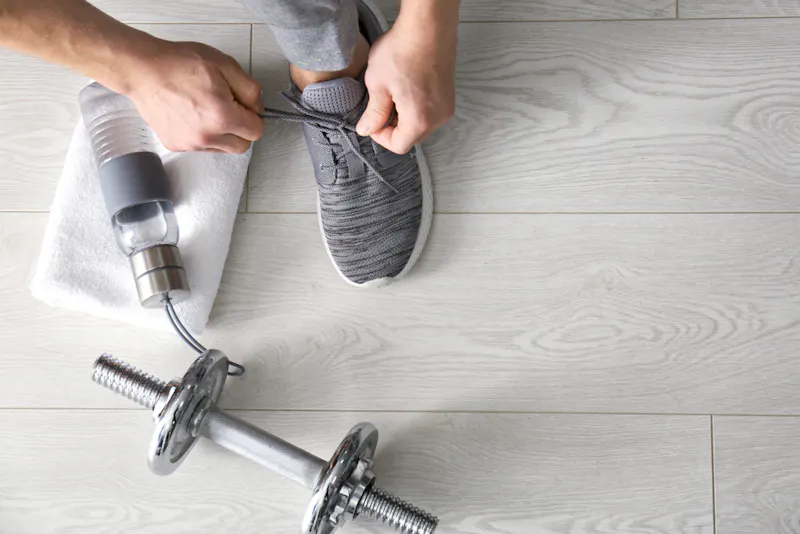Male menopause
What's covered?



Menopause is a condition more commonly associated with women. But men can also experience discomfort and unpleasant symptoms when they get older. Find out more about the causes, symptoms, and treatment options for male menopause.
What is male menopause?
The term ‘male menopause’ can often be misleading.
It's called andropause when declining testosterone levels cause unpleasant symptoms and discomfort.
But testosterone levels don't decline as fast as oestrogen during a woman's menopause. And sometimes, symptoms are caused by lifestyle or psychological factors rather than hormones.
Unlike female menopause, men undergoing male menopause are still fertile.
Low testosterone and male menopause
The term ‘male menopause’ can describe the decline of testosterone as a man ages. But this isn't as clean-cut as hormone changes in women and men differ.
When ovulation ends in women, hormone levels lower drastically in a short time. In men, testosterone declines slowly over many years. This slow decline in testosterone is also called late-onset hypogonadism.
A man's testosterone levels start to decline about 1% a year after 40. It's easy to miss low testosterone levels, as some men don't have symptoms. When there are symptoms, they can often be associated with ageing.
This condition is known as andropause when symptoms are definitely because of declining testosterone.
You can check your testosterone levels as part of a men's health blood test.
What are the symptoms of male menopause?
Signs and symptoms of male menopause cover three categories — sexual, physical, and psychological.
Sexual symptoms are probably the most common reason for a man to seek medical attention. They can include:
- loss of sex drive
- erectile dysfunction
- loss of interest in sex
Physical symptoms include:
- increased fatigue
- decreased muscle strength and endurance
- increased body fat
- difficulty sleeping
- short-term memory problems
Psychological symptoms include:
- mood swings and irritability
- depression and anxiety
- loss of self-confidence
- poor concentration
These symptoms are commonly associated with ageing, and emotional or psychological problems can cause some.
Even though hormonal issues like declining testosterone levels might cause them, it's essential to rule out all possible causes.
When does male menopause start?
Men can experience symptoms linked to declining testosterone anywhere between 40 to 60. Still, it can happen in your late 30s as well.
How long does male menopause last?
Male menopause isn't as simple to define as female menopause. So, it's harder to say precisely how long it will last.
According to some studies, testosterone slowly declines, and symptoms can last for 15-20 years.
Treatment for male menopause
Treatment will depend on the cause and severity of your symptoms, as they can be lifestyle-related or caused by low testosterone levels.
Talk to your GP, who'll advise you of the next steps. They might refer you to an endocrinologist (a hormone specialist) who'll prescribe a hormone treatment like:
- tablets
- injections
- gels
When you have a testosterone deficiency (which can be confirmed by a blood test), you can replace it with these medications. You might see improvements in psychological and sexual function, bone and muscle health, anaemia and frailty.
But, replacement therapy has some risks, like an increased risk of some cancers, heart attacks, and strokes. It can also interfere with sperm production and decrease fertility.
You can increase your testosterone levels naturally with some lifestyle changes:
Manage stress
Try identifying triggers and practising gratitude, journaling, and self-compassion. You can also try engaging in mindfulness or deep breathing. And make time for hobbies you enjoy.
Get enough sleep
Practice good sleep hygiene. Aim for between 7—9 hours of good quality sleep every night.
Eat well
Eat a healthy diet rich in vitamin D, zinc and magnesium. These nutrients are linked to testosterone production. You can also take a vitamin D supplement.
Keep moving
Do regular exercise. Resistance training like weight lifting might help boost testosterone levels. Be careful not to overtrain, as this might cause levels to drop.
Manage your weight
Ensure you’re a healthy weight and in good overall health. Regular home blood tests might help you track any lifestyle changes you make.
Manage your alcohol intake
Reduce and preferably eliminate alcohol. Long-term alcohol use can cause the testes to shrink.
Find out more about how alcohol affects your health.
National Health Services (2019). The ‘male menopause’. Retrieved 8 June 2022 from https://www.nhs.uk/conditions/male-menopause/
Al-Sharefi, A., Wilkes, S., Jayasena, C. N., & Quinton, R. (2020). How to manage low testosterone level in men: a guide for primary care. The British journal of general practice : the journal of the Royal College of General Practitioners, 70(696), 364–365. https://doi.org/10.3399/bjgp20X710729
Feldman, H. A., Longcope, C., Derby, C. A., Johannes, C. B., Araujo, A. B., Coviello, A. D., Bremner, W. J., & McKinlay, J. B. (2002). Age trends in the level of serum testosterone and other hormones in middle-aged men: longitudinal results from the Massachusetts male aging study. The Journal of clinical endocrinology and metabolism, 87(2), 589–598. https://doi.org/10.1210/jcem.87.2.8201